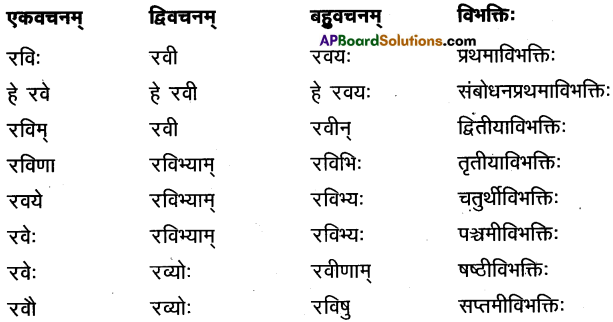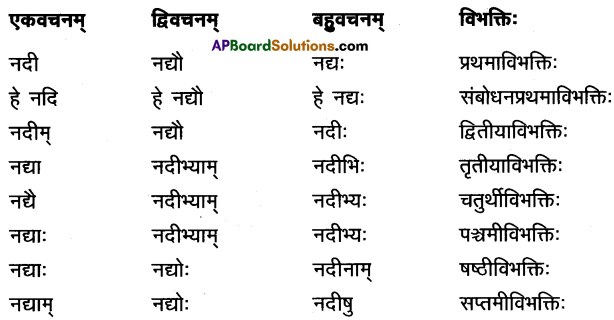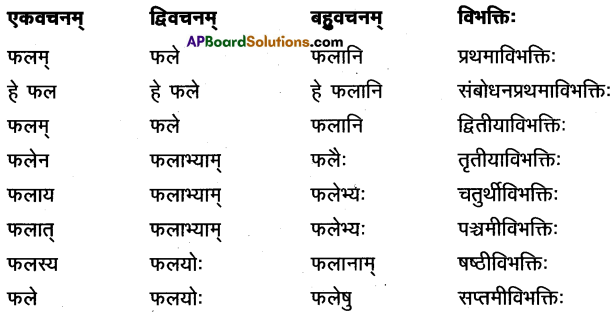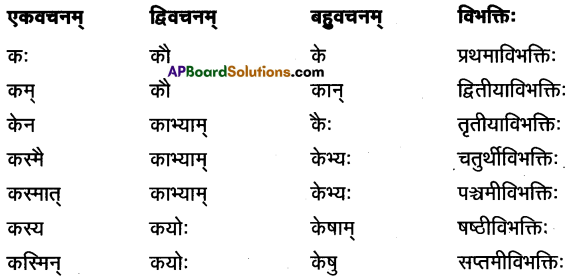Self-assessment with AP Inter 1st Year Sanskrit Model Papers Set 6 allows students to take charge of their own learning.
AP Inter 1st Year Sanskrit Model Paper Set 6 with Solutions
Time : 3 Hours
Max Marks : 100
सूचना : प्रथम, द्वितीय, तृतीयप्रश्नान् अनुवादप्रश्नं च विहाय अन्ये प्रश्नाः संस्कृतभाषायामेव समाधातव्याः ।
अ) दानं भोगो ………….. तृतीयगतिर्भवति ॥
जवाब:
दानं भोगो नाशः तिस्रो गतयो भवन्ति वित्तस्य ।
यो न ददाति न भुङ्क्ते तस्य तृतीयागतिर्भवति ॥
Three are the ways to money Charity, enjoyment and loss. The money not given in charity or spent for enjoyment will be lost.
आ) अपूज्या यत्र ………………. मरणं भयम् II
जवाब:
अपूज्या यत्र पूज्यन्ते पूज्यानां च व्यतिक्रमः ।
त्रीणि तत्र भविष्यन्ति दुर्भिक्षं मरणं भयम् ||
Where the unworthy are honoured and the worthy are not honoured, three things happen there famine, death and fear.
II. एकं निबन्धप्रश्नं समाधत्त ।
अ) “मायावदृ” इति पाठ्यभागस्य सारांश संक्षेपेण लिखत ।
जवाब:
Introduction : The lesson “Mayavatu” is taken from the work Kumarasambhava written by Kalidasa. The fifth canto of the work describes the arrival of Siva in the guise of a celibate to test Parvati.
The false celibate: A celibate, shining with spiritual glow, wearing deerskin and holding a staff of Palasa entered the hermitage of Parvati like the embodiment of Brahmacharya. After receiving the hospitality of Parvati he asked her whether fuel sticks and kusa grass were easily available. He further said that physical body is the primary means of dharma. शरीरमाद्यं खलु धर्मसाधनम् ।
The celibate’s query: Then he asked her the reason for her penance saying that friendship with the good happens in seven steps or words. मनीषिभिः साप्तपदीनमुच्यते | She was born in a noble family, beautiful, wealthy and young. She could not face any humiliation in her parental house. Her father’s abode was divine. She should not search for a husband as a gem does not search, it is searched for. न रत्नमन्विष्यति मृग्यते हि तत् । He offered her half of his penance to get her desired husband. The reason for Parvati’s penance: The friend of Parvati told the celibate that having rejected Indra and others, Parvati wanted Siva as her husband. He was not to be won over by beauty as he destroyed Manmatha. When Parvati confirmed it, the celibate said that he would not support her as he knew Siva as one indulged in inauspicious practices.
Censure of Siva by the celibate: The celibate said that it would be inappropriate to let ashes take the place of sandal paste on the bosom of Parvati. People would smile seeing her riding a bull. Siva had deformed body. His birth was unknown. His wealth was indicated by his nakedness.
Parvati’s reply: Then Parvati replied angrily that he did not know Siva properly. Stupid people despise the acts of the noble. Though penniless, Siva was the source of riches. He was the lord of the three worlds. No one knew whether his body shone with ornaments or snakes, elephant hide or fine garments, and whether he held a skull or sported the crescent moon on the crest. Indra, who rode an elephant bowed to him. How could anyone know the origin of Siva, who was considered the cause of the creator ? She said that her mind was fixed on him with the feeling of love.
When Parvati was about to go from there, Siva revealed himself to her and said that he became her slave. Fruition makes exhaustion fresh again. क्लेशः पुनर्नवतां विधत्ते ।
आ) उपवासदीक्षिताः कपयः कथं बुभबक्षापीडिताः ?
जवाब:
Introduction: The lesson: was written by Srisailam Tatacharya, who was known as D. T. Tatacharya. He authored Kavyalankara and Mugdhanjali. In this satirical work he advises that imitating others is not good.
The greatness of the monkey race: Once the lord of the monkeys assembled all his followers and told them that previously their forefathers became great by their valour, strength and learning. Hanuman, who crossed the ocean, torched the city of Lanka and mastered the nine grammars belonged to their race only. He asked them that by what quality the humans became superior to them.
The decision of the monkeys: Then he asked them to find out why the monkeys should not have the same authority as the humans had. He told them that they should follow the customs or otherwise their animalhood would be well established. He suggested fasting on the day after as it was the Ekadasi day. The monkeys agreed to it.
Fasting of the monkeys on the Ekadasi day: The next day the monkeys took bath in the river and started their fast. But who could control his natural impulses? The monkeys became restless in a moment. They yawned, shook their hands, stretched their legs and kissed the tips of their tails. Then one of them suggested that they should go to the Jambu tree so that the next day breaking the fast would be easier.
The others agreed to it and moved to the tree. As they sat under the tree in a row, one of them suggested that they should climb the tree, and all of them did so. The juicy Jambu fruits: The monkeys passed the minutes like aeons. As the juicy fruits fell down making sounds when the branches were moved by the wind, their mouths watered. Then one of them said that they could as well keep the ripe fruits in the bag between their chins so that there would be no need to search for fruits the next day. Agreeing to it the monkeys jumped down and started to fill their mouths with the fruits.
The poet ends the story saying that what should be done afterwards need not be told to them.
III. एकं निबन्धप्रश्नं समाधत्त ।
अ) कामावेशात् निवर्तयितुं पुण्डरीकं प्रति कपिञ्जलः किमुवाच ।
जवाब:
Introduction : The lesson Kapinjalopadesa is an extract from the Kadambari, written by Bana. Pundarika, an ascetic fell in love with a celestial nymph Mahaswetha, His friend Kapinjala advised him that it was not proper for him to lose his selfcontrol. He asked him to condemn the Love-god.
Kapinjala’s questions :
Kapinjala told Pundarika that it was not proper for Punda-rika to behave in such a way as the common men would behave. The ascetics had the wealth of courage. धैर्यधना हि साधवः । He asked Pundarika why he did not restrain himself. How he was attacked by the senses. Where had his courage, self-restraint, calmness, celibacy, learning, disinterestedness and distaste for pleasures gone? If people like him were also sullied by passion then there was no use of intellect, study of the scriptures, culture, knowledge received from the teachers, and awakening. निरर्थकः संस्कारः |
He asked him how did he not notice the crystal rosary that fell from his hand and taken away by that evil woman. He exclaimed that Pundarika was absent minded, and thought of rescuing him before his heart was stolen by that evil woman. अहो विगत चेतनत्वम् ।
When Pundarika accepted that he was attracted by the beauty of Mahaswetha, Kapinjala further advised thus.
Kapinjala’s advice :
He asked Pundarika whether it was taught by his teachers of he studied it in the scriptures. Was it a means to acquire Dharma, a new kind of penance, a mystic vow or path leading to heavens? Could he even imagine this, let alone tell or see ? Why did he allow the Cupid make him a laughing-stock? Only fools are tormented by the Cupid मूढो हि मदनेन आयास्यते Could he have happiness in something condemned by the virtuous and honoured only by the vile ?
He said that he was a fool, who watered a garden of poisonous plants, embraced a sword creeper, held a black serpent or touched a burning coal thinking them to be something else. If he could not restrain his senses or control his mind, what was the use of his knowledge like that of the light of a firefly? And he advised him to condemn the stupid Love-god.
आ) शबरी रामाय को कथामुक्तवती ?
जवाब:
The Teacher’s Query:
Once a teacher, while going to the forest along with his students asked them which water was the best in the world. The students gave different answers such as the water of the Gangas, rain water and tears. The teacher then told them a story.
Sabari’s Hospitality :
While searching for Sita in the forest, Rama and Lakshmana met Sabari. She worshipped Rama, and offered him sweet fruits. There were beautiful and fragrant flowers in front of the place where Sabari lived. Rama asked her about those flowers.
Matanga and his students :
Sabari told him that the hermitage of Matanga used to be there at that place. Many students came for their studies to the hermitage. Once it was the end of the summer, and monsoon was about to set in. But no arrangement to store fuel sticks was made.
Sage Matanga and his students went to the forest, and cut wood. The young and the old carried the load on their heads and returned to the hermitage. Every- one was drenched in sweat. Beads of sweat dropped from the bodies on the ground.
The fragrance :
The next day everyone at the hermitage was surprised at the fragrance that spread there. The students found that the fragrance came from the direction of the forest where they went the day before. They went there and saw beautiful flowers blossomed here and there. Those flowers were not there the day before. The students ran back to Matanga, and reported to the teacher that strange inci- dent. Matanga went there, and touched those flowers affectionately.
The flowers of sweat :
Matanga told his students that the flowers were born from their sweat. Sweat born of labour was pure. The heart of Mother Earth seemed to have bloomed up on seeing their effort. He told them that there was nothing purer than physical labour. If the farmer and the weaver did not work, there would be no crop or clothes. The world moved on because of the labourers. He advised them to respect the workers. The students promised Matanga that they would respect the labourers and see that they were comfortable.
Rama and Lakshmana bowed to those flowers and went away.
The real sweat :
Having told the story the teacher explained to his students that the sweat from which any useful thing was produced was the sacred and true sweat. He advised his students to make the lives of the workers happy when they grew up.
IV. चतुर्णां प्रश्नानां समाधानानि लिखत । (4 × 2 = 8 M)
अ) चाणक्यः कस्य राज्ञः अमात्यः ?
जवाब:
चाणक्यः चन्द्रगुप्तस्य राज्ञः अमात्यः । सः नन्दवंशम् उन्मूल्य चन्द्रगुप्तं सिंहासने अध्यारोपयत् ।
आ) राजसान्नवाच्याः के भवन्ति ?
जवाब:
अतिकषायपदार्थः, अतिलवणम्, अत्युष्णापदार्थः अतिक्षारपदार्थः, अत्याम्लपदार्थः, अतिक्षातिदाहपदठार्थाः राजसान्नवाच्या भवन्ति ।
इ) बोपदेवविरचितः व्याकरणशास्त्रग्रन्थः कः ?
जवाब:
बोपदेवविरचितः व्याकरणशास्त्रग्रन्थः मुग्धबोधः ।
ई) कृपणस्य अग्रे गगनं दृष्ट्वा सर्वे किं कृतवन्तः ?
जवाब:
कृपणस्य अग्रे गमनं दृष्ट्वा सर्वे अट्टहासं कृतवन्तः ।
उ) नागार्जुनः कः ?
जवाब:
नागार्जुनः रसायनशास्त्रज्ञः प्रसिद्धः चिकित्सकः च ।
ऊ) पेटिकायां व्यापारी किम् अपश्यत् ?
जवाब:
पेटिकायां व्यापारी एवं जीर्णं धौतवस्त्रम् एकं प्राचीनं करांशुकम् एकं पुरातनं पादत्राणम् च अपश्यत् ।
V. द्वयोः संदर्भ व्याख्यानं लिखत ।
अ) अचक्षुर्विषये घोषं वारणस्येव नर्दतः ।
जवाब:
परिचयः – एतत् वाक्यं दशरथस्य पश्चात्तापः इति पाठ्यभागात् सवीकृतम् । अयं पाठ्यभागः
वाल्मीकिरामायणे अयोद्याकाण्डतः स्वीकृतः ।
सन्दर्भ: – दशरथः कौसल्यां प्रति मुनिशापवृत्तान्तम् कथयन् एवम् उक्तवान् ।
भावः – अदृष्टिगोचरे रात्रौ गजस्य शब्दः इव श्रुतः ।
विवरणम् – दशरथः कौसल्याम् उक्तवान् यत् सः एकदा रात्रौ मृगयार्थं सरयूतीरं गतवान् । तत्र रात्रौ जलेन पूर्यमाणस्य कुम्भस्य शब्दः गजस्य शब्दः इव श्रुतः ।
आ) न रत्नमन्विष्यति मृग्यते हि तत् ।
जवाब:
परिचयः एतत् वाक्यं मायावटुः इति पाठ्यभागात् स्वीकृतम् । एषः भागः कालिदासस्य कुमारसम्भवे पञ्चमसर्गात् स्वीकृतः ।
सन्दर्भः – मायावटुः पार्वतीम् एवं वदति ।
भावः – रत्नं अन्वेषणं न करोति । तत् अन्विष्यते ।
विवरणम् : पार्वत्याः तपोवनं एकः जटिलः प्रविवेश । सः अवदत् यत् यदि पार्वती पतिमिच्छति तपसा अलम् । रत्नं न अन्विष्यति । तत् अन्वेष्यते ।
इ) भवति सकलभाषाजन्मदात्री यतस्त्वम् ।
जवाब:
परिचयः – एतत् वाक्यं अमरवाणीप्रशस्तिः इति पाठ्यभागात् स्वीकृतम् । अस्य कविः श्रीमान् ई. शठकोपाचार्यः ।
सन्दर्भः – कविः अमरवाणीं प्रशंसन् एवं वदति ।
भावः – त्वम् सकलभाषाणां जननी ।
विवरणम् – जगति सर्वाः भाषाः संस्कृतसंपर्केण विराजन्ते । संस्कृतभाषा सकलभाषाजननी ।
ई) यतः प्रकृष्येत मनुष्यवर्गः ।
जवाब:
परिचयः – एतत् वाक्यं कपीनामुपवासः इति पाठ्यभागात् स्वीकृतम् । अस्य कविः श्रीशैलं ताताचार्यः ।
सन्दर्भः – कपिसार्वभौमः अन्यान् कपीन् एवं वदति ।
भावः – मनुष्याः कथं प्रकर्षम् आप्नुवन्ति ।
विवरणम् – कपिसार्वभौमः वदति यत् कपयः लोकत्रये प्रसिध्दाः बभूवुः । परन्तु केन मनुष्याः प्रकर्षम् वति ।
VI. द्वयो: संदर्भ व्याख्यानं लिखत ।
अ) अहो विगतचेतनत्वम् ।
जवाब:
परिचयः एतत् वाक्यम् ‘कपिञ्जलोपदशः इति पाठ्यभागात् स्वीकृतम् । अस्य मूलग्रन्थः कादम्बरी । अस्य कविः बाणः ।
सन्दर्भः महाश्वेतायाम् अनुरक्तम् पुण्डरीकम् सन्मार्गे प्रवर्तयितुं कपिञ्जलः एवम् उपदिशति ।
अर्थः – अहो, अचेतनत्वम् ।
विवरणम् – कपिञ्जलः पुण्डरीकं वदति यत् पुण्डरीकस्य स्थितिः तस्य अनुरूपा न । सः अचेतनः इवास्ति । करतलात् भ्रष्टाम् अक्षमालाम् अपि न लक्षयति ।
आ) कुम्भकारोऽपि यो विद्वान् स तिष्ठतु पुरे मम ।
जवाब:
परिचयः – एतत् वाक्यं भोजस्य औदार्यम् इति पाठ्यभागात् स्वीकृतम् । अस्य कविः बल्लालः ।
सन्दर्भः – भोजः मुख्यामात्यम् एवम् अवदत् ।
भावः – विद्यावान् चेत् कुम्भकारः अपि मम नगरे निवसतु ।
विवरणम् – कदाचित् भोजः मुख्यामात्यम् एवम् अवदत् – अविद्वान् चेत् ब्राह्मणः अपि नगरात् बहिः गच्छेत् । विद्वान् चेत् कुम्भकारः अपि नगरे वसतु ।
इ) पुण्यरूपाणि एतानि पुष्पाणि वन्दे |
जवाब:
परिचयः – एतत् वाक्यं स्वेदस्य पुष्पाणि इति पाठ् यभागात् स्वीकृतम् । अस्य रचयित्री डा. माधवी जोषी ।
सन्दर्भः – रामः शबरीम् एवं वदति ।
भावः – मातङ्गस्य पुण्यरूपाणि एतानि पुष्पाणि नमस्करोमि ।
विवरणम् – शबरी स्वेदपुष्पाणां कथां रामाय अकथयत् । तत् श्रुत्वा रामः तानि पुष्पाणि नमस्कृतवान् ।
ई) स्वच्छतायै प्रयतामहे ।
जवाब:
परिचयः – एतत् वाक्यम् वर्षापरिदेवनम् इति पाठ्यभागात् स्वीकृतम् । अस्य रचयिता आचार्य गुल्लपल्लि श्रीरामकृष्णमूर्तिः ।
सन्दर्भः – स्वच्छतापरिरक्षणार्थं प्रयत्नं करणीयमिति वदन्ती वर्षादेवी एवं प्रबोधयति ।
भावः – स्वच्छतार्थं प्रयत्नं कुर्मः ।
विवरणम् – विश्वं कलुषितम् इति दुःखित्वा वर्षादेवी स्वच्छतापरिरक्षणार्थं जनान् प्रबोधयति । स्वच्छतार्थं प्रयत्नं कुर्मः । यः क्रियावान् स पण्डितः । इति ।
VII. त्रयाणां प्रश्नानां समाधानानि लिखत ।
अ) मुनिः दशरथं किमिति शशाप ?
जवाब:
मुनिः दशरथं राजन् पुत्रशोकेन त्वं कालं करिष्यसि इति शशाप |
आ) धर्मसाधनेषु आद्यं किम् ?
जवाब:
धर्मसाधनेषु आद्यं शरीरम् ।
इ) पुराकृतानि पुण्यानि मानवान् कथं रक्षन्ति ?
जवाब:
पुराकृतानि पुण्यानि मानवान् वने रणे शत्रुजलाग्निमध्ये, समुद्रे, पर्वते, सुप्तमपि, प्रमत्तमपि, विषमस्थितमपि रक्षन्ति ।
ई) किम् अश्वमेधेन समं विदुः ?
जवाब:
दरिद्राय कृतं दानं, शुन्यलिङ्गपूजनम्, अनाथप्रेतदहनं च अश्वमेधसमं विदुः ।
उ) सकलभाषाजन्मदात्री का ?
जवाब:
सकलभाषा जन्मदात्री अमरवाणी ।
ऊ) कोऽपि कपिः कथं मौनं बिभेद ?
जवाब:
जृम्भां विधाय, हस्तं व्यवधूय, पादं प्रसार्य, गात्रं परिवर्त्य, पुच्छाग्रम् आचुम्ब्य कोऽपि कपिः मौनं बिभेद |
VIII. त्रयाणां प्रश्नानां समाधानानि लिखत ।
अ) कपिञ्जलोपदेशं कस्मात् ग्रन्थात् स्वीकृतम् ?
जवाब:
कपिञ्जलोपदेशः कादम्बरी इति गद्यकाव्यात् स्वीकृतः । अस्य काव्यस्य कर्ता बाणभट्टः ।
आ) धनिनां धनं किम् ?
जवाब:
यत् ददाति यत् अश्नाति तदेव धनिनां धनम् ।
इ) तीक्ष्णदंष्ट्रस्य धर्मोपदेशं श्रुत्वा शशकः किमवदत् ?
जवाब:
तीक्ष्णदंष्ट्रस्य धर्मोपदेशं श्रुत्वा शशकः एवम् अवदत्-एष नदीतीरे तपस्वी धर्मवादी तिष्ठति । तदेनं पृच्छावः ।
ई) बालकाः स्थाने स्थाने कानि दृष्टवन्तः ?
जवाब:
बालकाः स्थाने स्थाने सुन्दराणि पुष्पाणि विकसितानि दृष्टवन्तः ।
उ) व्यासाश्रमद्वारा प्रकटिताः ग्रन्थाः के ?
जवाब:
व्यासाश्रमद्वारा प्रकटिताः ग्रन्थाः योगवासिष्ठम्, शङ्करविजयः, पातञ्जल योगदर्शनम्, विवेकचूडामणिः, अष्टावक्रगीता, बृहदारण्यकोपनिषद्, छान्दोग्योपनिषद् इत्यादयः ।
ऊ) स्वच्छताया विषये सर्वकारः किं करोति ?
जवाब:
स्वच्छताया विषये सर्वकारः बहुयन्नान् करोति । नगरपालिकासु, परिशुद्धकर्मचारिणः नियुक्ताः । आकाशवाणी-दूरदर्शनीद्वारा बहु प्रचारयति ।
IX. विरामग्रहणाय अभ्यर्थनपत्रं लिखत ?
जवाब:
गुन्टूर्
दिनाङ्कः 20-11-2018
सविधे –
प्रधानाध्यापकः / प्रांशुपालः
प्रभुत्व (जूनियर्) उच्चमाध्यमिक कलाशाला,
गुन्टूर्
मान्याः !
विषयः विरामस्य कृते अभ्यर्थनम् ।
मम सोदर्याः विवाहार्थम् अहं श्वः स्वग्रामं गमिष्यामि । अतः कृपया दिनत्रयस्य 21-11-2018 तः 23-11-2018 पर्यन्तं विरामं यच्छन्तु इति सादरप्रणामपूर्वकं विज्ञापयामि । मम अनुपस्थितिसमये पाठ्यमानान् पाठान् मित्रसकाशात् ज्ञात्वा अहं पठिष्यामि ।
सधन्यवादम् ।
भवतां विधेयः छात्रः
नाम: × × × × × × ×
अनुक्रमसंख्या × × × × × × ×
प्रभुत्व जूनियर् कलाशाला,
गुन्टूर् ।
(अथवा)
पुस्तकप्रेषणविषये पत्रं लिखत ?
जवाब:
कडप
दिनाङ्कः 20-01-2018
सविधे –
मान्यसञ्चालकाः,
सरस्वतीविद्याप्रकाशन्,
विजयवाटिकॉ
मान्याः !
भवद्भिः प्रकाशितेषु अधोनिर्दिष्टानि पुस्तकानि मया यथानिर्दिष्टम् अपेक्ष्यन्ते ।
| क्र.सं | पुस्तकनाम | कविः | प्रतय: |
| 1 | कुमारसम्भवम् | कालिदासः | 5 |
| 2 | श्रीमद्रामायणम् | वाल्मीकिः | 4 |
| 3 | पञ्चतन्त्रम् | विष्णुशर्मा | 6 |
| 4 | भर्तृहरिसुभाषितानि | भर्तृहरिः | 3 |
कृपया एतानि पुस्तकानि वि.पि. पि. द्वारा अधोसूचितं सङ्केतं प्रति प्रेषयन्तु ।
सधन्यवादम् ।
भवदीयः / भवदीया
नाम …………
गृहसंख्या 2-11-18
गान्धीरोड़, कडप ।
X. द्वयोः शब्दयोः सविभक्तिकरूपाणि लिखत । (2 × 6 = 12 M)
अ) रवि
जवाब:

आ) नदी
जवाब:

इ) फल
जवाब:

ई) किम् (पुं.)
जवाब:

XI. द्वयोः धातुरूपाणि लिखत | (2 × 3 = 6 M)
अ) लिखेत्
जवाब:

आ) खादतु
जवाब:

इ) भवति
जवाब:

ई) मोदिष्यते
जवाब:

XII. त्रीणि सन्धिनामनिर्देशपूर्वकं विघटयत ।
अ) वाणीशः
जवाब:
वाणी + ईश = सवर्णदीर्घ सन्धिः
आ) विक्रमोर्वशीयम्
जवाब:
विक्रम + ओर्वशीयम् = गुण सन्धिः
इ) वसुधैव
जवाब:
वसुधा + एव = वृद्धि सन्धिः
ई) वाण्येका
जवाब:
वाणी + एका = यणादेश सन्धिः
उ) पावकः
जवाब:
पौ + अक: = अयवायाव सन्धिः
ऊ) सोऽपि
जवाब:
सः + अपि = पूर्वरुप सन्धिः
XIII. त्रीणि सन्धिनामनिर्देशपूर्वकं सन्धत्त ।
अ) पितृ + ऋणम्
जवाब:
पितॄणाम् = सवर्णदीर्घ सन्धिः
आ) महा + इन्द्राः
जवाब:
महेन्द्रः = गुण सन्धिः
इ) महा + ऐश्वर्यम्
जवाब:
महैश्वर्यम् = वृद्धि सन्धिः
ई) धातृ + अंश:
जवाब:
धात्रंशः = यणादेश सन्धिः
उ) भानो + ए
जवाब:
भानवे = अयवायाव सन्धिः
ऊ) का + अपि
जवाब:
कार्येऽपि = पूर्वरुप सन्धिः
XIV. आन्ध्रभाषायां वा आङ्ग्लभाषायां वा अनुवदत ।
अ) अहं ग्रामं गच्छामि ।
जवाब:
I go to village.
आ) ते पाठम् अपठन् ।
जवाब:
Where did they go.
इ) यूयं कदा खादिष्यथ ।
जवाब:
When will you eat ?
ई) सः नगरं गमिष्यति ।
जवाब:
He will go to city.
उ) सर्वे गुणाः काश्चनमाश्रयन्ते ।
जवाब:
All the virtues depend on gold.
XV. एकेन पदेन समाधत्त ।
अ) दशरथः कां नदीम् अन्वगात् ?
जवाब:
सरयूनदीम् ।
आ) “मायावटुः” इति पाठ्यभागः कस्मात् स्वीकृत: ?
जवाब:
कुमारसम्भवात् ।
इ) घनस्य तृतीया गतिः का ?
जवाब:
नाशः ।
ई) प्रत्यक्षे स्तुत्याः के ?
जवाब:
गुरवः ।
उ) अनरवाणी सर्वमानवान् शुभमार्गे कैः गमयति ?
जवाब:
धर्मसूत्रैः ।
XVI. एकेन पदेन समाधत्त ।
अ) कपिञ्जलः कः ?
जवाब:
पुण्डरीकस्य मित्रम् |
आ) भोजस्य मुख्यामात्यः कः ?
जवाब:
बुद्धिसागरः ।
इ) तीक्ष्णदंष्ट्रः कः ?
जवाब:
अरण्यमार्जारः ।
ई) तृणवत् कान् न गणयेम ?
जवाब:
श्रामिकान् ।
उ) मार्गाः काभिः कलुषिताः ?
जवाब:
धूलिभिः ।